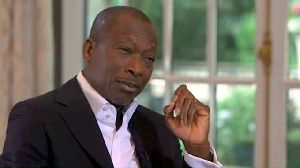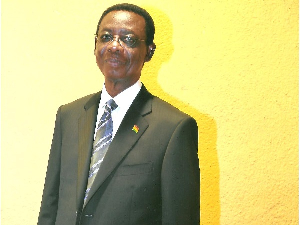General News of Thursday, 4 March 2021
Source: www.ghanaweb.com
COCOBOD trial: No records of Dr Opuni asking scientists to shorten chemical testing period - Witness
The case against Dr Stephen Opuni who is standing trial, together with two others, in the ongoing fertilizer purchase has taken a different turn in favour of the accused.
Chief Inspector Thomas Prempeh Mercer, a CID officer of the Ghana Police Service who is testifying as a prosecution witness, has admitted under cross-examination that the CID never saw any “written” evidence indicating a directive was given to scientists to shorten the testing period for the Lithovit fertilizer.
From the beginning of the case, Dr Stephen Opuni, a former Ghana Cocoa Board (COCOBOD) CEO, who is standing trial with two others, was accused of writing to the Cocoa Research Institute of Ghana (CRIG) urging them to sidestep their usually independent and respected procedure for testing chemicals used in cocoa farming.
The investigator who had stated earlier that COCOBOD purchased an untested fertilizer because its former chief executive officer Dr Stephen Opuni directed scientists at CRIG to shorten the testing period for the Lithovit fertilizer denied the same vehemently.
Chief Inspector Mercer had alleged that Dr Opuni instructed somebody at COCOBOD to circumvent procedures at CRIG with regards to the testing of the Lithovit fertilizer.
Dr Opuni vehemently denied the allegations by the Police CID.
The first prosecution witness, Dr F. M. Amoah who was the then Executive Director of CRIG explained in his statement to the police that he never carried out any such directive, but Chief Inspector Thomas Mercer suggested to the court that Dr Amoah lied.
The disgraced investigator, who is the 7th prosecution witness, had claimed that Opuni gave the directive and it was followed and obeyed, thereby contradicting the first prosecution witness.
That is why it is shocking that under cross-examination on Monday, Chief Inspector Mercer opened up, admitting that his team could not place their hands on any documentary evidence to back claims that such a directive was given.
Lead counsel for Dr Opuni, Samuel Cudjoe on Monday, March 1, insisted that his client never directed that the required period of testing chemicals and fertilizers be shortened, but witness Chief Inspector Mercer earlier disagreed.
It was then pointed out to him by Opuni’s counsel: “That is why there is no written directive with regards to shortening the test period for Lithovit.”
Chief Inspector Thomas Prempeh Mercer admitted this time and tried to explain himself.
“My Lord, in the course of our investigation, we did not come across any written directive given by the first accused. But in a statement which is in evidence in this court, given by Dr F Amoah, the then Executive Director of CRIG, which Counsel for A1 made me to read in this court, it clearly indicates that A1 actually called a meeting of scientists in his office in Accra Cocoa House. It is on this basis that when Dr F M. Amoah was writing his statements, he stated that on his return from Accra he called a meeting of all the Senior Scientists and told them not to adhere to the directives given by A1. So this goes to confirm that indeed there was a directive and my lord, I want to state that this directive was carried out. That is why the shortening of Lithovit [testing] was carried out”.
Dr Opuni’s lawyer asked: “Chief Inspector Prempeh, you just informed this court that Dr Amoah stated that he informed the Scientists not to follow the directives. Isn’t it?”
The investigator answered, “Yes my lord, and I continued by saying that indeed that directive was carried out to the letter.”
The witness added that Dr Amoah mentioned one Mr Kutsuate and Dr Francis Baah as persons who were present when that directive was given by Dr Opuni in January 2014.
But the court was later told that even if such a directive was given, Mr Kutsuate could not have been present then because he was employed months later, in April 2014.
When lawyer Cudjoe asked the investigator if he took a statement from Mr Kutsuate, he answered in the affirmative.
However, when Opuni’s counsel confronted him with the fact that Mr Kutsuate did not give any statement to the police or the Economic and Organised Crimes Office (EOCO), the investigator quickly beat a retreat and raised his hand, telling the court he wanted to add something to his previous answer.
“Yes, my lord,” the witness jacked up. “My lord, I need to refer to our docket because I know [every] person that we interrogated or took a statement from, but I need to refer to our docket on Mr Kutsuate, because my lord, we spoke to many witnesses in this case. Most of them had retired. Some willingly came to give a statement. Others spoke to us on the phone and others on a conference call, but they did not come. In this instance, I spoke to him on the phone, that is why I want to check the docket to see if I took a statement from him.”
Interestingly, the other witness, Dr Baah told investigators in his statement that based on a survey conducted by the Cocoa Health and Extension Division (CHED) “farmers preferred Lithovit to that of the granular fertilizers”.
Dr Stephen Opuni and businessman Seidu Agongo are facing 27 charges including willfully causing financial loss to the State and contravention of the Public Procurement Act.
They have both pleaded not guilty to the charges and are on a GH¢300,000 self-recognisance bail each.
Find excerpts of the cross-examination below:
Q: In fact, he, Mr Kutsuate did not give any statement to either EOCO or the Police?
A: My lord, that is why I pray for the indulgence of the court that if I can go through the docket to check and provide the answer.
Q: So as you sit here the only evidence which you claim to have is your conversation with Dr Francis Baah with respect to the directives which Dr Amoah claimed was issued by 1st Accused at this meeting?
A: My lord, that is not so. My lord, in my evidence-in-chief on the 11th of January, in this court, I did indicate that before A1 assumed office as CE in early 2014 he had had a meeting with some senior Scientists at CRIG when he paid a working visit to CRIG and at that meeting was Senior Scientists including Dr F. M. Amoah; Mr Afrifa, the head of the Soil Science Division at CRIG; Dr Francis Baah; Dr Akrofi; and Dr Ameyaw.
Q: In fact, Dr Francis Baah gave a statement to you, isn’t it?
A: My lord, no, he gave a statement at EOCO.
Q: And in fact, in this statement, all that Dr Baah states about Lithovit is that farmers like Lithovit so much that he asked that this be documented, isn’t it?
A: My lord, that is not true.
Q: Can you read his statement?
A: [Witness reads and explains]. My lord, Dr Baah’s unit CHED is not responsible for taking data on the performance of an agrochemical. My lord, the duty of CHED is to distribute the agrochemical to the 60 cocoa farming districts and also train extension officers of COCOBOD. My lord, at CRIG we have different units that undertake this survey and one of these units is the Social Science and Statistics Unit (SSSU) which was then headed by Dr Mercy Asamoah. So my lord, what Dr Baah could have said was well distribution of the agrochemicals, but not that farmers like the Lithovit or not.
Q: Did Dr Baah state that some farmers preferred Lithovit to that of the granular fertilizers?
A: My Lord that is what Dr Baah has written in his statement.
Q: In fact between you, Chief Inspector Prempeh as an investigator and Dr Baah as a technical man, he is better placed to comment on fertilizers than you, isn’t it?
A: My lord that is true because he is a scientist and was working at CRIG. But my lord what I am saying is the protocols or the lay-down procedures at CRIG.
The case has been adjourned to March 11 for cross-examination to continue.












